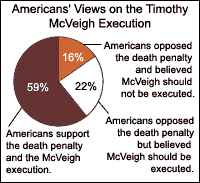Jurors' Trauma
Brenda Barrett, a gentle, soft-spoken woman, and her husband Jim, a leather-skinned former Marine officer who did two tours in Vietnam, live on an idyllic patch of Virginia farmland 50 minutes south of Washington, D.C. Mr. Barrett boards, breaks and trains horses at his Oak Leaf Stables.
| There is, in fact, nothing more onerous that an ordinary citizen is asked to do, by his or her government, than to contemplate taking the life of another human being. |
"I'm gonna let you ride the palomino," explains Jim, " the new palomino that I got. But when you first get on her, you gotta take a deep seat and a long rein... Just sit there calmly and talk to her. She don't know the word walk. She just trots."
Mrs. Barrett, an obstetrical nurse, delivers babies. In 1993, she and 11 other jurors sentenced 27-year-old Lonnie Weeks to death for murdering a Virginia trooper, Jose Cavazos. To this day, Mrs. Barrett finds it difficult to talk about the trial.
"I don't think there's anything you can compare it to, because I've never been asked to take the life of someone else," says Brenda Barrett.

Data shows that a percentage of the American public only support the death penalty for the worst offenders. Twenty two percent of Americans opposed the death penalty but supported the execution of Oklahoma City bomber Timothy McVeigh. Source: USA Today/CNN/Gallup poll, May 2, 2001 | |
Simply stated, this is the fundamental reality of a capital murder trial. There is, in fact, nothing more onerous that an ordinary citizen is asked to do, by his or her government, than to contemplate taking the life of another human being.
"You know when you're on a case like this," explains Brenda Barrett, "you see the blood, you see the photographs of the dead body and where the bullets entered, you see a layout of the crime scene. It becomes a reality to you. It's not something you just read in the paper, but it's something you pick up, you touch, you look at, you see you smell, you know, you become part of it."
Other jurors who have served in capital cases express similar feelings. David Dobyns builds houses in Northern Virginia. He was the foreman of Brenda Barrett's jury.
"It was an emotional roller coaster basically, for a full week," says Dobyns. "I consider myself a Christian. I don't want to put anyone to death, but this was just a very tough decision. It's one of the hardest things I've had to do."
But what happens to ordinary citizens when they're operating under that kind of pressure? Charged by their government with this momentous decision, do they think clearly? Do they follow the law? Do they get it right?
Next: The Cruz Case 

